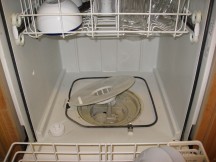
This weekend we went on a cooking/cleaning binge, and one of the things that needed cleaning the most was the filter in our dishwasher. It was surprisingly easy to remove, but so disgusting that Jason and I took turns washing it out—neither of us wanted to deal with it for long. It definitely hasn’t been cleaned in the year we’ve lived in our apartment and, from the looks of it, for years before that, either. I didn’t even know it existed until I read Don’t Throw It Out!
Since the length of most dishwashers’ cycles depends on how much dirt they’re sensing coming off the dishes, cleaning the filter can make them more efficient. Although many newer dishwashers have self-cleaning filters, it should be one of the first things you check if your dishes aren’t getting completely clean.
I know what some of you are thinking: Why are you using the dishwasher in the first place? Isn’t washing dishes by hand more efficient?
People can be very proud of their particular dishwashing methods, but the best study to date, from the University of Bonn, has shown that a full dishwasher load washed by hand takes an average of 27 gallons. Even the most efficient handwashers used 8 gallons of water. By comparison, an Energy Star–qualified dishwasher uses less than 5.8 gallons per load.
Water conservation isn’t a big deal in the Northeast, but in this case the most energy is used in heating the water, so water consumption is a good yardstick. I probably wouldn’t run out to upgrade a five-year-old dishwasher just to improve its efficiency, but a 15-year-old dishwasher uses twice as much water as a new one. While some people argue that the production of the dishwasher makes it less efficient than handwashing, studies have shown that over a 15-year life cycle, energy use accounts for 95% of its environmental impact.
You could argue that with all the variables, it’s impossible to say exactly how your particular hand-washing stacks up to my particular dishwashing. But even with the benefit of the doubt given entirely to the by-hand proponents, it’s a wash, and in that case it’s much like the paper or plastic bag debate—not worth arguing about (except to say, use less of them). I’m not a big fan of handwashing dishes to begin with, so the dishwasher’s my choice. I’m just happy that my laziness is justified by facts.
Things we can do to make our dishwasher even more environmentally friendly include:
- Turn off the heat dry feature. If you feel like the dishes take too long to dry this way, open the dishwasher door slightly to let the air circulate.
- Turn your hot water heater down to 120 degrees if your dishwasher has its own heating element (most do).
- Don’t pre-rinse. Scrape instead.
- Run only full loads, but don’t overload. You want water getting to every inch of your dishes. (Seriously, I don’t know what the people in Rachel Getting Married were thinking.)
- Use a phosphate-free detergent. Phosphate runoff leads to algae blooms (much like nitrogen from fertilizers).
And, by the way, federal dishwasher standards are changing in January, and Energy Star standards are changing in July 2011, so if you’re planning on buying a new dishwasher, you might want to wait for the more efficient models. Check out Consumer Reports’ eco-site Greenerchoices.org for more buying tips.
Cross-posted on pragmaticenvironmentalism.com